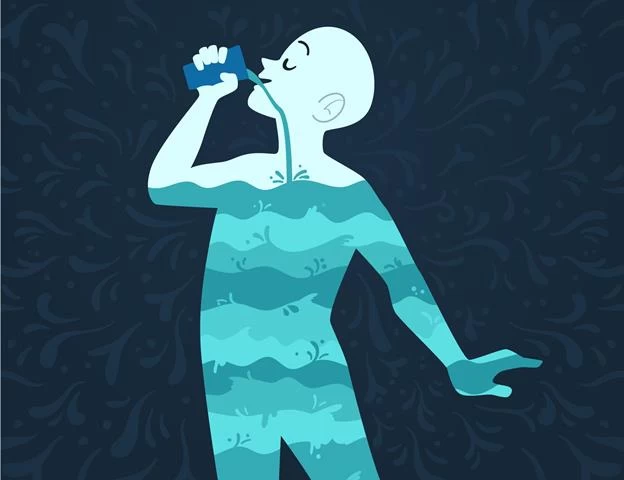
Water, It's Life...
- Water, It's Life...
- What Is Water Loss (Dehydration)?
- What Are the Causes of Water Loss?
- Water Loss (Dehydration): What Does It Mean?
- What Are the Symptoms of Water Loss?
- Who Does Water Loss Affect the Most?
- What Are the Dangers of Water Loss?
What Is Water Loss (Dehydration)?
Water is a vital component for the functioning of our body. In order for our body to maintain various functions, it is necessary to regularly consume an adequate amount of water. However, sometimes water loss can occur, especially during the summer months, and this poses a serious threat to our body. Medically, water loss is referred to as 'dehydration.'
Dehydration refers to a condition where the amount of water in the body is less than normal. This condition occurs when fluid loss exceeds water intake. Water loss typically occurs as a result of excessive sweating, diarrhea, vomiting, urinary tract infections, or insufficient fluid intake.
What Are the Causes of Water Loss?
Several significant causes of water loss include:
- Excessive Sweating: Physical activity, excessive heat, or fever can lead to excessive sweating, resulting in water loss.
- Diarrhea and Vomiting: The body loses fluid in cases of diarrhea or vomiting. This condition can be associated with infections that disrupt the normal functioning of the digestive system, food poisoning, or digestive disorders.
- Insufficient Fluid Intake: Failing to consume an adequate amount of water can lead to water deficiency in the body. Dehydration can occur from being thirsty or limiting fluid intake.
- Excessive Urination: Certain conditions can cause increased urination, leading to water loss. For example, diabetes or certain medications can increase urine production.
- Poor Nutrition: Consuming insufficient amounts of fluids or excessive salt can affect the body's water balance and lead to dehydration.
- Chronic Illnesses: Some chronic illnesses can affect the body's fluid balance and cause water loss. For example, diabetes, kidney diseases, or hormonal disorders can increase water loss.
- Urinary Tract Infections: Urinary tract infections can lead to frequent urination and increased water loss due to the higher water content in urine.
- Excessive Alcohol Consumption: Alcohol affects the kidneys negatively, increasing urine formation and causing fluid loss.
Any of these reasons, or a combination of them, can lead to water loss. The severity of water loss can vary depending on the cause and duration. When symptoms of water loss are noticed, it is important to replenish the lost fluids. Additionally, identifying and treating the underlying causes may be necessary.

Water Loss (Dehydration): What Does It Mean?
Water is a vital component for the functioning of our body. In order to sustain various bodily functions, it is necessary to regularly consume an adequate amount of water. However, sometimes water loss can occur, especially during the summer months, posing a serious threat to our body. Medically referred to as 'dehydration,' water loss indicates a condition where the amount of water in the body is below normal levels. This condition occurs when fluid loss exceeds fluid intake. Water loss commonly occurs due to excessive sweating, diarrhea, vomiting, urinary tract infections, or inadequate fluid intake.
What Are the Symptoms of Water Loss?
The following are symptoms that may occur during water loss (dehydration):
- Dry Mouth and Thirst: There is a feeling of dryness in the mouth and a constant sensation of thirst.
- Dark-Colored Urine: When there is a lack of water in the body, the kidneys mix less water with urine, resulting in darker-colored urine.
- Reduced Urination: The body regulates kidney functions to prevent water loss. Therefore, during water loss, urine output decreases, and the amount of urine reduces.
- Headache: Water loss can cause the brain tissue to shrink and the brain membranes to tighten, resulting in a headache.
- Fatigue and Weakness: Water deficiency in the body can lower energy levels and lead to feelings of fatigue, weakness, and exhaustion.
- Dizziness and Fainting: Water loss can cause a decrease in blood volume and a drop in blood pressure, which can lead to dizziness and even a feeling of fainting.
- Increased Heart Rate: The body may increase the heart rate to compensate for water loss.
- Dry Skin and Loss of Elasticity: Water deficiency can cause dryness and loss of elasticity in the skin. The skin may appear pale and lose its elastic structure.
- Difficulty Focusing: Water loss can affect brain functions and cause a lack of concentration, attention deficits, and a sense of mental confusion.
- Low Blood Pressure: Water loss can result in a decrease in blood volume and a drop in blood pressure. This can increase the risk of dizziness, weakness, and fainting.
These symptoms can vary depending on the severity and duration of water loss. While mild water loss symptoms are generally milder, more pronounced and life-threatening symptoms can occur during severe dehydration. When symptoms of water loss are noticed, it is important to replace the lost fluids. It is also important to seek medical attention in cases of severe water loss.
Who Does Water Loss Affect the Most?
Water loss (dehydration) can affect people of all ages, but certain groups are particularly at risk. The following are groups of individuals who are more prone to water loss:
- Children: Children require more water relative to their body weight compared to adults. Additionally, children may be less attentive to feelings of thirst or fluid loss, making them more susceptible to water loss.
- Older Adults: Older adults are more prone to water loss due to a decreased ability to retain water in their bodies. Additionally, the sense of thirst may decrease with age, leading to a tendency to consume inadequate amounts of water. Chronic illnesses, medication use, and other factors associated with aging can also increase the risk of water loss.
- Exercise Enthusiasts: Excessive sweating during physical activity leads to water loss. Individuals who engage in exercise require more water than usual and should pay extra attention to replenishing fluid loss.
- Workers in High Temperatures: Working in excessively hot environments increases sweating and water loss. Workers in outdoor settings or hot climates are at risk of dehydration.
- Individuals with Chronic Illnesses: Chronic kidney disease, diabetes, heart failure, and other health conditions can disrupt water balance and lead to water loss.
- Those Experiencing Diarrhea or Vomiting: Fluid loss can occur rapidly during episodes of diarrhea or vomiting. Fluid loss may be more prevalent due to infections, food poisoning, or digestive system issues.
- Alcohol or Drug Addicts: Alcohol or drug use can increase water loss in the body and raise the risk of dehydration.
These groups should pay special attention to fluid intake due to their increased susceptibility to water loss. It is important to ensure adequate fluid intake and prevent dehydration if any symptoms or risk factors are present.

What Are the Dangers of Water Loss?
Water loss (dehydration) can pose serious dangers to the body. Here are some potential risks of water loss:
- Electrolyte Imbalance: Water loss can disrupt the balance of electrolytes (such as sodium, potassium, chloride, etc.) in the body. Electrolyte imbalance can affect vital bodily functions such as the nervous system, muscle function, and cellular activity.
- Kidney Failure: Water loss can interfere with proper kidney function. The kidneys filter waste materials and toxins from the body to produce urine. Dehydration can impair kidney function and lead to kidney failure.
- Circulatory Problems: Water loss can result in a decrease in blood volume. This can lower blood pressure within the circulatory system, hindering the delivery of sufficient oxygen and nutrients to organs. Severe water loss can lead to a life-threatening condition called circulatory shock.
- Heatstroke: Excessive water loss due to extreme heat or intense exercise can disrupt body temperature regulation and increase the risk of heatstroke. Heatstroke is a life-threatening condition that requires immediate medical intervention.
- Mental and Emotional Disorders: Water loss can affect brain functions, leading to memory problems, lack of concentration, anxiety, restlessness, irritability, and even depression.
- Organ Failure: Water loss can impair the proper functioning of organs, increasing the risk of organ failure. Organs such as the kidneys, heart, lungs, and brain can be affected by water loss.
- Death: In cases of severe water loss, it may not be possible to maintain the normal functioning of vital organs. In such cases, water loss can have fatal consequences.
The dangers of water loss emphasize the importance of maintaining water balance. When symptoms of water loss are noticed, it is crucial to replenish lost fluids and seek medical attention if necessary. Additionally, water intake should be monitored regularly, especially for at-risk groups.
What are the precautions to be taken against water loss?
Taking the following precautions is important to prevent water loss:
- Sufficient Water Intake: Drinking an adequate amount of water daily is one of the fundamental steps to prevent water loss. Generally, it is recommended to consume at least 8 glasses (2 liters) of water per day. Increased water intake may be necessary during physical activity, hot weather, or sweating.
- Be Mindful of Physical Activity: When exercising or engaging in heavy physical activity, make sure to drink enough water to compensate for water loss. Taking frequent water breaks is important to prevent water loss during prolonged exercise.
- Take Precautions in Hot Weather: Hot weather conditions can cause increased sweating and water loss. In such cases, it is important to seek shade or cooler areas frequently, wear a hat and light clothing, and avoid prolonged outdoor exposure during the hottest hours of the day.
- Monitor Fluid Intake: Make use of foods and beverages that contain fluids other than water. For example, opt for foods with high water content such as fruit juices, soups, fresh fruits, and vegetables.
- Take Precautions in Cases of Diarrhea or Vomiting: To prevent water loss during episodes of diarrhea or vomiting, you can use oral rehydration solutions. These solutions are specially formulated with water, electrolytes, and, if necessary, sugar. Additionally, it is important to consume the liquids and foods recommended by your doctor.
- Do Not Neglect Children: Children are more susceptible to water loss, so make sure they drink an adequate amount of water. It is important to keep children hydrated by offering them water or fluids frequently in hot weather.
- Limit Alcohol and Caffeinated Beverages: Alcohol and caffeinated beverages can cause increased fluid excretion from the body. Therefore, limiting alcohol and caffeinated beverages or increasing water intake in addition to them is important.
- Seek Medical Attention When You Feel Unwell: If you experience severe symptoms of water loss or have risk factors, consult a healthcare professional. Water loss can have more serious consequences, especially in children, the elderly, or individuals with chronic health conditions.
Remember, preventing water loss and maintaining a healthy level of hydration is important for our bodies. Drinking an adequate amount of water, consuming fluid-rich foods, and considering risk factors will help prevent water loss.
In conclusion, water loss (dehydration) can be a serious health issue for our bodies. When symptoms are noticed, increasing water consumption and seeking medical attention when necessary are important. Identifying and treating the underlying causes of water loss are crucial. Regular water intake and necessary precautions to prevent water loss are necessary to maintain a healthy lifestyle.






